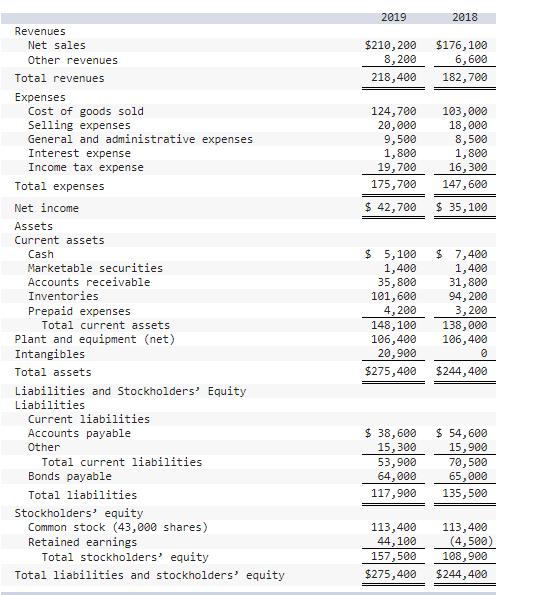Answered step by step
Verified Expert Solution
Question
1 Approved Answer
Calculate The Following Ratios For 2018 And 2019. Since 2017 Numbers Are Not Presented, Do Not Use Averages When Calculating Calculate the following ratios for
Calculate The Following Ratios For 2018 And 2019. Since 2017 Numbers Are Not Presented, Do Not Use Averages When Calculating


Calculate the following ratios for 2018 and 2019. Since 2017 numbers are not presented, do not use averages when calculating the ratios for 2018. Instead, use the number presented on the 2018 balance sheet.
- 1.Net margin. (Round your answers to 2 decimal places.)
- 2.Return on investment. (Round your answers to 2 decimal places.)
- 3.Return on equity. (Round your answers to 2 decimal places.)
- 4.Earnings per share. (Round your answers to 2 decimal places.)
- 5.Price-earnings ratio (market prices at the end of 2018 and 2019 were $5.96 and $4.88, respectively). (Round your intermediate calculations and final answers to 2 decimal places.)
- 6.Book value per share of common stock. (Round your answers to 2 decimal places.)
- 7.Times interest earned. Exclude extraordinary income in the calculation as they cannot be expected to recur and, therefore, will not be available to satisfy future interest payments. (Round your answers to 2 decimal places.)
- 8.Working capital.
- 9.Current ratio. (Round your answers to 2 decimal places.)
- 10.Quick (acid-test) ratio. (Round your answers to 2 decimal places.)
- 11.Accounts receivable turnover. (Round your answers to 2 decimal places.)
- 12.Inventory turnover. (Round your answers to 2 decimal places.)
- 13.Debt to equity ratio. (Round your answers to 2 decimal places.)
- 14.Debt to assets ratio. (Round your answers to the nearest whole percent.)
Revenues Net sales Other revenues Total revenues Expenses Cost of goods sold Selling expenses General and administrative expenses Interest expense Income tax expense Total expenses Net income Assets Current assets Cash Marketable securities Accounts receivable Inventories Prepaid expenses Total current assets Plant and equipment (net) Intangibles Total assets Liabilities and Stockholders' Equity Liabilities Current liabilities Accounts payable Other Total current liabilities Bonds payable Total liabilities Stockholders' equity Common stock (43,000 shares) Retained earnings Total stockholders' equity Total liabilities and stockholders' equity 2019 $210,200 8,200 218,400 $ 5,100 1,400 35,800 101,600 4,200 148, 100 124,700 103,000 20,000 18,000 9,500 8,500 1,800 1,800 19,700 16,300 175,700 147,600 $ 42,700 $ 35,100 106,400 20,900 $275,400 $ 38,600 15,300 53,900 64,000 117,900 2018 113,400 44,100 157,500 $275,400 $176,100 6,600 182,700 $ 7,400 1,400 31,800 94, 200 3,200 138,000 106,400 0 $244,400 $ 54,600 15,900 70,500 65,000 135,500 113,400 (4,500) 108,900 $244,400
Step by Step Solution
★★★★★
3.35 Rating (161 Votes )
There are 3 Steps involved in it
Step: 1
SOLUTION 2019 2018 a Market price per share 488 596 b EPS 099 4270043000 082 3510043000 c Price Earn...
Get Instant Access to Expert-Tailored Solutions
See step-by-step solutions with expert insights and AI powered tools for academic success
Step: 2

Step: 3

Ace Your Homework with AI
Get the answers you need in no time with our AI-driven, step-by-step assistance
Get Started


